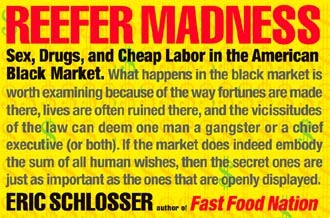| Eric Schlosser |
Eric Schlosser, the 'Fast Food Nation' scribe, serves up leftovers with 'Reefer Madness'
It's an hour before Eric Schlosser is scheduled to speak to the crowd at Bookpeople in Austin, but already the folding chairs are filling with the fans and fanatics. In the front row, a smartly arrayed woman in her 30s sits primly; behind her, 20-somethings munch on snacks and flip through magazines.
Everyone has a crisp copy of Reefer Madness - the hotly anticipated follow-up to the best-selling Fast Food Nation. Anxious Bookpeople employees flutter about with clipboards; Schlosser is twenty minutes late. A steady stream of people ascend the stairs to the off-limits third floor where his entourage is rumored to be. After some time, this reporter is summoned - led through a side passage up to the room where Schlosser sits surrounded by copies of his books.
Reefer Madness begins with a short explanation of "The Underground": the secret black market that drives an unknowable portion of our economy. The Gross National Product, the unemployment rate, the inflation rate: "What do those statistics really mean," posits Schlosser, "if 20 percent, 10 percent, or even 5 percent of a nation's economy somehow cannot be accounted for?" His is a tough question that shakes the very foundations of our beliefs, and Schlosser attempts to answer it through an examination of the industries that "don't advertise": the marijuana trade, migrant farm workers involved in the growing of strawberries, and the porn industry. The eponymously named first section centers on the story of Mark Young, an Indiana ho-bunk who was given life without parole for his negligible role in a drug deal - a tale that is interspliced with a brief history of marijuana laws, the War on Drugs in the '80s, and the sentencing reforms that resulted in today's mandatory minimums. The second section, "In the Strawberry Fields," is a history of the strawberry industry plucked straight off the vine: detailing the evolution of the modern sharecropping debt peonage system that allows the companies to maintain control over their product while avoiding much of the legal and moral responsibility for their workers. The last section, "An Empire of the Obscene," chronicles the rise and fall of Rueben Sturman, the little-known king of porn distribution and production, with digressions detailing the history of anti-obscenity laws; the desperate quest of a porn star for "credits" (in adult films); the Adam and Eve mail order company; and Roman sexual practices. If you're wondering how this all ties back into the underground economy, you're not alone. Schlosser tried unsuccessfully in the mid-'90s to find a publisher for Reefer Madness, but it was only after the success of Fast Food Nation that he had the power to "leverage getting this thing into print."
True to the tradition of his first book, Reefer Madness is a solid piece of reporting: driven by first-person interviews, and buoyed by extensive statistics - all conveyed with Schlosser's carefully measured narrative. In person, Schlosser is as soft-spoken as his reputation would have you believe, proffering his phone number for follow-up questions, and considerately pausing when the tape on the recorder runs out. In the crowded Bookpeople office, flanked by a photographer, a store employee, his handler, and myriad ringing phones, faxes, and modems, Schlosser polishes off a snack before turning his attention to the large stack of books before him. He methodically signs the books as he talks, making eye contact with the windows, and punctuating his answers with peppery asides to the room as he scrawls his signature: "Oohh ... shit! I was in the mode ... 'For Vicky'... OK, I'm with you, I'm here." Mentioning Fast Food Nation frequently, Schlosser quotes facts from his latest book with photographic attention to detail - sometimes even using similar adjective sequences. Unnervingly, he makes few references to materials not covered within his book - resulting in an unusual conversation that parrots his text.
Approaching the underground economy, Schlosser was armed with three investigative pieces he wrote in the mid-'90s, and when it came time to link them, he chose a cautious approach: "What I really didn't want to do was change them so that they referred to one another in the text, because I really felt like that would be untrue to them as individual pieces of writing." Instead, he continues, "I tried to, tried in some subtle ways, to order them and write them, so that by the end of this book there is almost an argument that has unfolded."
True to his word, Reefer Madness is faithful to the "individual pieces of writing," leaving Schlosser's argument almost unfolded. A close reading reveals that he made very few changes to the initial articles, which made no attempt to tackle the larger subject of the shadow economy. With the exception of a few additional paragraphs and updated factoids, "In the Strawberry Fields" is virtually indistinguishable from the 1995
Despite his "reworking," the three sections of Reefer Madness reflect their vintage, with few references to events of the past five years. Readers familiar with the subjects will be disconcerted by references to out-dated events - for example, a section on the '96 Arizona referendum on medical marijuana, without a mention of the heated legislative battles in '97 and '98, in which the legislature tried unsuccessfully to castrate the popular voter referendum. When asked about the discrepancy, Schlosser seemed surprised: "What did I miss?" Only the past five years.
Chronological discrepancies aside, Reefer Madness is most disappointing for what it failed to address. For a book purportedly about the underground economy, the omission of any post-9-11 analysis is striking - especially in the migrant worker and pot pieces, where the impact of strengthened border security is felt the strongest. When asked about his re-writing process, Schlosser responds with this contradiction: "Sadly, you know, I think that I didn't have to change these very much, especially with the marijuana and migrant worker pieces, things have actually gotten significantly worse." The porn industry underwent a "fundamental restructuring" after the explosion of VCR and DVD technology, writes Schlosser, but "Empire of the Obscene" barely mentions the Internet -let alone its impact on the pornography industry. Via e-mail, Schlosser dismisses porn on the Internet as "overhyped," although he concedes that by using Sturman as his narrative frame, he gave "the article somewhat of a historical bias." (Sturman's porn empire crumbled in '92, and he died in '97 - well before the advent of totallyteensluts.com.)
"I tried to write them so they're not history pieces," Schlosser said. "There are some collections that are evocative of the date that they were written, but for me, I wanted these to read as though they were written yesterday." But given his mild revisions, Reefer Madness remains a solid collection of three tangentially related articles - a well-written indictment of 1997's status quo. For the uniniated, Reefer Madness serves as a primer: laying out the history of our hypocrisy when it comes to sex, drugs, and cheap labor. These are issues that must be discussed, and deserve a solid place in the public discourse. But by putting out a book whose research was freshest five years ago, and whose overriding theme is scarcely developed, and then marketing it as a polemic on the "proper role of the state and the limits of the free market," Schlosser plays us for fools. Fast Food Nation taught us to examine critically what we consume: to peek under the "New and Improved!" wrapper, and to decide for ourselves what we are swallowing. In the case of Reefer Madness, it's just the same old bun and patty. •




















